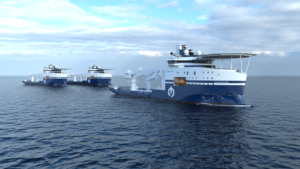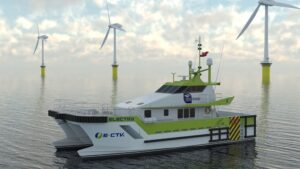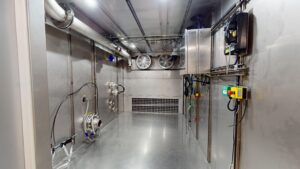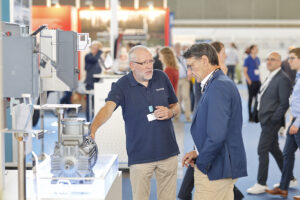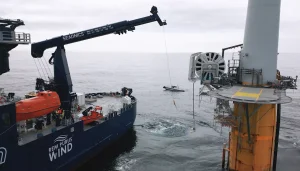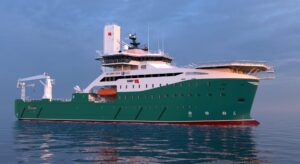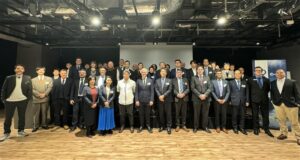Industry News
Trafigura orders four dual-fuel ammonia-powered vessels
Commodities company Trafigura has signed a contract for four medium gas carriers (MGC) that will be capable of using low-carbon ammonia as a propulsion fuel when delivered. The vessels will be built at HD Hyundai Mipo Dockyard in Ulsan, South Korea.
Ammonia-powered medium gas carriers
The vessels will carry LPG or ammonia and the first ship will be delivered in 2027. Each vessel will be equipped with a dual-fuel low-carbon ammonia engine, supporting Trafigura’s commitment to reduce the carbon intensity of its own shipping fleet by 25% by 2030.
Andrea Olivi, head of wet freight for Trafigura, said, “We are excited to embark together with HD Hyundai Mipo on this ambitious project which supports our commitments to decarbonizing shipping and will help us to develop the global low-carbon ammonia bunkering infrastructure needed for zero-carbon shipping to become a reality.”
Decarbonizing shipping
This initiative forms part of the company’s goal to develop the low-carbon fuels and vessels required to decarbonize global shipping.
Vard to build a hybrid ocean energy construction vessel for Island Offshore
Vard, Norwegian subsidiary of the Fincantieri Group, and Norwegian shipping group Island Offshore have signed a contract for the design and construction of one hybrid-powered ocean energy construction vessel (OECV).
Hybrid-powered ocean energy construction vessel
This 120m vessel will have a beam of 25m and an offshore subsea crane of 250 tons, and will accommodate 130 people on board. It will be prepared for alternative low-emission fuel.
The design of the ship, to be delivered in 2027, reportedly enables flexible configuration depending on the specific operations the vessels will perform. It will undertake subsea operations, including inspection, maintenance and repair, pipe laying, subsea infrastructure construction and installation, and diving support and will carry equipment for remotely operated underwater inspection.
Volvo Penta to create world’s first retrofitted electric crew transfer vessel
The diesel engines of a crew transfer vessel (CTV) will be replaced with a zero-emissions Volvo Penta solution to create what the company says will be the world’s first retrofitted electric crew transfer vessel (E-CTV).
The vessel is being developed for sea transportation and crew transit service operator Tidal Transit. The cost of the retrofit is estimated at £8m (US$10m) with £6.3m (US$7.87m) coming from the Zero Emissions Vessel and Infrastructure (ZEVI) program. The program is part of the UK government’s plan (via its Department for Transport and Innovate UK innovation agency) to develop, deploy and operate clean maritime solutions.
Ricardo expands UK hydrogen test facility
Strategic, environmental and engineering consultancy Ricardo has invested in the conversion of an existing building on-site at its £2.5m (US$3.13m) hydrogen test facility at its UK headquarters in Shoreham-by-Sea.
The investment is intended to facilitate the development of testing for large-scale marine engines. According to the company, the conversion will deliver state-of-the-art facilities to support Ricardo’s development of hydrogen and fuel cell services and solutions for global customers.
£2.5m hydrogen test facility
In January 2021, Ricardo announced that it had opened its £2.5m (US$3.13m) hydrogen test facility at its UK headquarters in Shoreham-by-Sea.
Jason Oms O’Donnell, managing director of automotive and industrial at Ricardo, said, “Hydrogen offers a real alternative to supporting decarbonization in several industries, including maritime, commercial vehicles, off-highway and aerospace where the combination of high-value assets, the longevity of fleets and the importance of safe implementation of new technology means that these sectors can be challenging to decarbonize.
Continue reading Ricardo expands UK hydrogen test facility at Electric Hybrid Marine Technology.
The world’s leading electric and hybrid marine technology trade fair opens in six weeks!
The world’s leading exhibition and conference for maritime electrification, decarbonization and GHG reduction solutions is returning to Amsterdam in June 2024!
Electric & Hybrid Marine Expo Europe
Exhibitors at the free-to-attend Electric & Hybrid Marine Expo Europe will showcase new electric and hybrid marine transportation and propulsion solutions, shore charging equipment and efficient emerging technologies to help realize zero-emission shipping and net zero. Visitors will be able to browse and ask in-depth questions to the experts on hand about the line-up of top technologies for the electrification and hybridization of workboats, ferries, superyachts and other marine vessels, plus port and harbor infrastructure.
Vard completes testing offshore charging solution
Vard, Maritime CleanTech and Rem Offshore have completed the testing of an offshore charging connection solution for zero-emission ships in the wind industry.
The prototyping phase of the project was officially launched in February 2023. Since then, charging tests have been conducted in port and offshore. Charging tests have been done in port with high-voltage charging of the ship’s batteries. Testing has also been done on the Ocean Charger offshore connection solution and the partners have demonstrated that the cable can be connected and disconnected under certain sea conditions.
By connecting vessels to the power grid in the wind farm and charging batteries regularly, the operational availability of emission-free vessel operations will be secured.
Bibby Marine and Gondan to build the world’s first electric commissioning service operation vessel
Bibby Marine has signed a shipbuilding contract to build what it states will be the world’s first truly zero-emission, electric commissioning service operation vessel (eCSOV), with shipbuilder Gondan.
Electric commissioning service operation vessel
The eCSOV will be built in Gondan’s Asturias shipyard in Spain and is scheduled to be delivered in 2026. The eCSOV, which has been designed in collaboration with UK-based ship designers Longitude, will feature a battery system, complemented by dual-fuel methanol engines for emission-free operations. The vessel will be equipped with mission equipment, a spacious insulated warehouse and climate-controlled electrical store.
To facilitate zero-emission operations, the eCSOV will feature high-voltage offshore charging facilities for rapid recharging.
UK and Japan host workshop to accelerate maritime autonomy
UK-based Lloyd’s Register (LR) and the National Physical Laboratory (NPL) have hosted a four-day workshop in Japan to accelerate the development of an assurance framework for maritime autonomy and instigate the development of appropriate regional and international regulations.
Maritime autonomy assurance framework
The workshop involved representatives from the Japan Maritime Bureau, Japan Coast Guard, universities, research institutes and Japanese maritime industry representatives, including NYK, MOL and K LINE, from the DFFAS+ Project (an initiative funded by The Nippon Foundation) for the design of future fully autonomous ships.
Discussions aimed to increase UK and Japanese regulators’ understanding of the potential of autonomy in maritime, build an assurance framework for its safe and reliable introduction and develop a pathway to exploit the opportunities autonomy affords.


